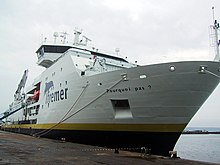IFREMER
| Institut français de recherche pour l'exploitation de la mer (French) | |
| Agency overview | |
|---|---|
| Formed | 1984 |
| Preceding agencies | |
| Headquarters | Brest, France |
| Employees | 1,593[1] |
| Annual budget | 213 million euros[1] |
| Agency executive |
|
| Website | https://www.ifremer.fr/ |
The Institut Français de Recherche pour l'Exploitation de la Mer (French for 'French Research Institute for Exploitation of the Sea') or Ifremer is an oceanographic institution in Brest, France. A state-run and funded scientific organization, it is France’s national integrated marine science research institute.[2]
Scope of works
[edit]Ifremer focuses its research activities in the following areas:
- Monitoring, use and enhancement of coastal seas
- Monitoring and optimization of aquaculture production
- Fishery resources
- Exploration and exploitation of the oceans and their biodiversity
- Circulation and marine ecosystems, mechanisms, trends and forecasting
- Engineering of major facilities in the service of oceanography
- Knowledge transfer and innovation in its fields of its activities
In 1985, Ifremer partnered with Dr. Robert Ballard for an ultimately successful expedition to locate the wreck of the RMS Titanic. In 1994 Ifremer assisted in the salvage of the cargo from the SS John Barry.
Ifremer operates a number of vessels, including the submarine Nautile.
In 2008, Ifremer partnered with Dr. Bruce Shillito for the testing and initial operations of the PERISCOP, a deep sea fish recovery device.[3]
In 2023, Ifremer sent the Atalante ship and the Victor 6000 ROV to the rescue operation of the Titan submersible.
Ifremer centres
[edit]Ifremer is located at 26 sites, including five main centres (Boulogne, Brest, Nantes, Toulon and Tahiti), with headquarters at Brest. About twenty research departments are associated to these centres :






- Centre Manche - Mer du Nord, associated to Université Lille Nord de France[4]
- Centre in Boulogne-sur-Mer
- Station of Port-en-Bessin
- Centre in Brest
- Station of Saint-Malo
- Station of Argenton-en-Landunvez
- Station of Concarneau
- Station of Lorient
- Station of La Trinité-sur-Mer
- Centre in Nantes
- Station of Bouin
- Station of La Rochelle
- Station of La Tremblade
- Station of Arcachon
- Laboratory of Bidart
- Centre Méditerranée (Toulon)
- Station of Sète
- Station of Palavas-les-Flots
- Unit of Montpellier
- Station of San-Giuliano
- Centre in Tahiti
- Délégation de Nouvelle-Calédonie
- Délégation of Guyane
- Délégation of la Réunion
- Délégation of Antilles
Notes and references
[edit]- ^ a b Ifremer: Presentation of the Institute
- ^ "Institut Français de Recherche pour l'Exploitation de la MER". Eurofleets - An alliance of European marine research infrastructure to meet the evolving needs of the research and industrial communities. Retrieved 2023-06-20.
- ^ Lever, Anna-Marie (31 July 2008). "Live fish caught at record depth". BBC News. Retrieved 18 February 2011.
- ^ French Décret n°2009-33 about Université Lille Nord de France
External links
[edit]
 Media related to Ifremer at Wikimedia Commons
Media related to Ifremer at Wikimedia Commons- Ifremer's official website




